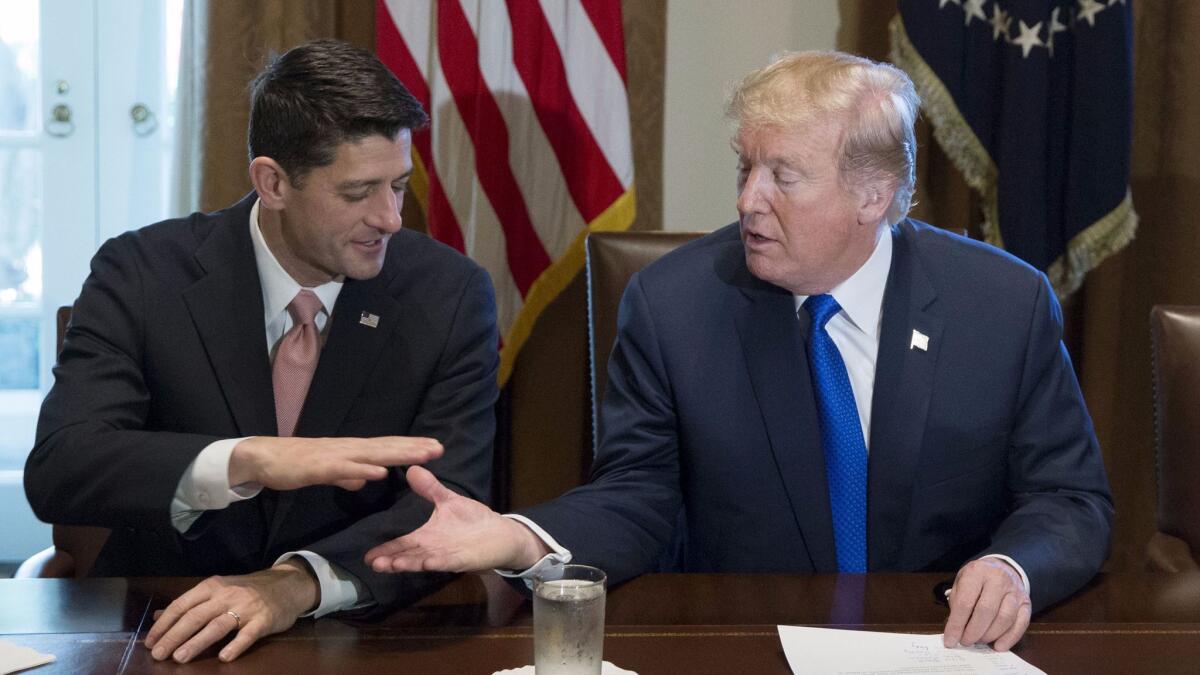Op-Ed: What a surprise: another tax plan to help the super rich

- Share via
After some delays, House Republicans finally released their tax cut plan Thursday. The Republicans had trouble coming up with a proposal for the same reason they had trouble coming up with a replacement for the Affordable Care Act: Outside of the Republican donor class, their goals are deeply unpopular. The Tax Cuts and Jobs Act reveals that President Trump and Speaker of the House Paul Ryan are, in different ways, utter frauds.
Despite a few sops to middle-class families with children, the bill redistributes wealth upward. The big cut in the corporate tax rate and the elimination of the alternative minimum tax overwhelmingly benefit the wealthy. The 4.6% cut for marginal income between $470,700 and $1 million for married couples benefits only the affluent. The gradual elimination of the estate tax will exclusively benefit extremely wealthy heirs.
Another important giveaway to the rich is the reduction of the tax on “pass-through” income for businesses owned by individuals or small groups of individuals like, say, Donald Trump’s. Because Trump has not released his tax returns, we don’t know exactly how much he would gain from this shift, but we know it would be yooge.
Meanwhile, the lowest marginal rate will go up to 12%, although the basic deduction available to individuals and families who don’t itemize will also increase.
Isn’t Paul Ryan a green eye-shaded deficit hawk? Er, no. His only true priority is to reduce taxes on the rich as much as he can.
The bill is a declaration of war on states with the temerity not to vote for Trump. It eliminates the deductibility of state income taxes while limiting the property tax deduction to $10,000, which effectively punishes residents of blue states (like California and New York) with relatively progressive tax codes. Republicans, in other words, want to use the federal tax code to incentivize states to make their tax codes more regressive.
Some parts of the House bill are defensible in the abstract. The mortgage interest deduction is a regressive tax break that contributes to the lack of affordable housing in popular urban areas, and reducing it to $500,000 from the current $1 million isn’t a bad idea. If the money were being used to, say, help fund healthcare, this would be a good trade-off. But using the money to fund tax breaks for the rich? Not so much.
The House proposal, then, is classic modern Republicanism: distributing wealth upward at a time of increasing inequality. And let’s not ignore the fact that the resulting loss in overall tax revenue to the federal government will inevitably lead, in time, to calls for reductions in spending—i.e., to government programs that help the poor.
As if that weren’t all bad enough, this bill is also a bait-and-switch on the part of the president.
Trump was able to capture the Republican nomination in part because he shrewdly recognized the unpopularity of the party’s economic agenda, even among the party’s base. Running as a protector of the welfare state and scourge of Wall Street, he appealed to cultural conservatives who cherish Social Security and don’t support upper-class tax cuts. The most relevant parts of the Republican establishment have nevertheless gone all-in on Trump for a simple reason: He apparently didn’t mean a word he said.
And this was obvious during the campaign — at least if you paid attention to Trump’s proposals rather than his rhetoric. During the first presidential debate of 2016, Hillary Clinton described her opponent’s tax plan as “Trumped-up trickle down.” Perhaps realizing that the intended catchphrase wouldn’t be included in any future compilation of great political wit, Clinton delivered the line awkwardly, and it went over poorly. But she wasn’t wrong. Trump’s campaign tax plan was very regressive, and represented the same basic priorities as the new House plan. Trump told voters he was a more populist Republican, but his governing agenda lines up with that of George W. Bush.
Speaking of Bush, another important element of the Republican plan is that—like the Bush tax cuts— it will massively increase the deficit. The House bill would cost roughly $1.5 trillion in its first decade alone.
But wait, you might ask, isn’t Ryan a green eye-shaded deficit hawk? Er, no. His only true priority is to reduce taxes on the rich as much as he can. And in this respect, Ryan is representative of his party as a whole. Virtually no congressional Republicans care about deficits, although they might pretend to care about deficits when Democrats are in charge.
Passing this bill won’t be easy. The attack on blue states might be too clever by half, as Ryan will need the votes of some Republicans in these states who are already facing tough re-election fights. But at least it’s clarifying. The bill shows that the goal of the new Republican boss is the same as the last one: Get as many tax breaks to the rich as possible.
Scott Lemieux is a lecturer in political science at the University of Washington.
Follow the Opinion section on Twitter @latimesopinion or Facebook
More to Read
A cure for the common opinion
Get thought-provoking perspectives with our weekly newsletter.
You may occasionally receive promotional content from the Los Angeles Times.






